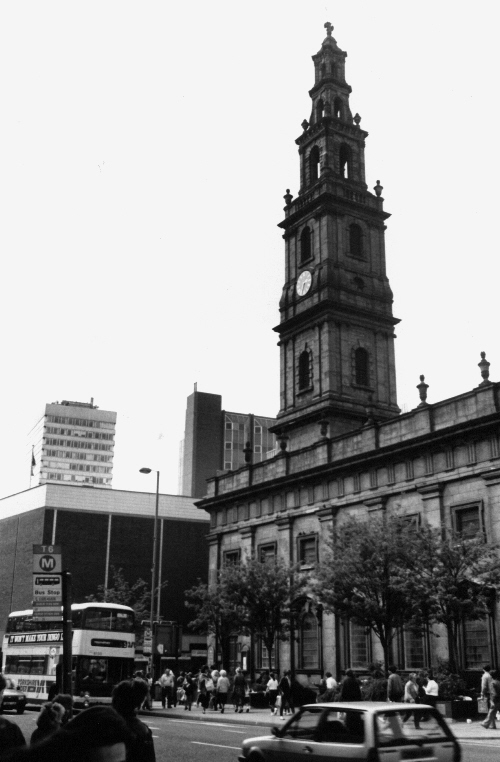 Three
churches to be found in Leeds city centre illustrate three of these ‘Seven
Facts of Life’.
Three
churches to be found in Leeds city centre illustrate three of these ‘Seven
Facts of Life’.
2.
Holy Trinity, Boar Lane, is a fine 18th
century church where Christians bravely minister to a wide range of special
groups in Leeds city centre.
The church stands almost defiantly amid the
bustle, surrounded by shoppers, unemployed youngsters and - at least on this
occasion - a sea of litter!
5. City of God?
"We are all city
dwellers now". The comment was made by an expert on rural life in a
publication about the future of the countryside.
He is right. of course. Across the world urban
life is becoming the norm. In this country even the tiniest village cannot claim
that ‘urbanising’ influences have passed it by.
In an urban society, almost by definition,
people tend to live their lives within a whole variety of intersecting circles
of relationships. Where they feel most ‘at home’ will vary (golf club? works
canteen?) but it is less and less likely to be among the neighbours down the
street. This is the ‘tribalism’ described in Chapter One.
People no longer feel ‘rooted’ to the
place where they have their home. The house itself is still important to them,
but all that matters about the neighbourhood is that it should be ‘quiet’.
The evidence that we are an urban society,
whether or not we live in a town, can be put together merely by listing all
those aspects of life which no longer take place within walking distance of a
person’s house.
The list would include at least the following:
* Education * Industry * Employment * Medical
Care * Recreation * Shopping * Social contacts * Relatives * Social Services *
The law * Local government * Control of housing
In residential areas, home is now reduced to
the admittedly not unimportant matters of eating, sleeping, baby-care,
hospitality and loneliness. Above all it is also the place where people guard
their privacy.
Most of human life, its broken relationships,
ethical dilemmas, hopes and fears for the future, now takes place among the
first group of activities, for the most part outside the residential area. When
problems do arise within the home, people tend to keep them a closely guarded
secret.
Clergy and ministers in residential areas will
still find plenty to occupy their time, but almost inevitably their work will be
biased towards the very old and the very young, because these are the ‘captive’
groups, the dependent half of the population, the only ones to whom the minister
can still gain ready access. Echoes here of the imbalance to be found in the
life of many supposedly ‘successful’ churches!
Occasionally the local church or its clergy
may be able to bandage the wounds of someone spiritually injured in the melée
outside the home, but only the lay people with their contacts and circles of
relationships away from the immediate locality will be able to do anything to
redeem the way life is lived in the melée itself.
Yet churches should have a greater priority to
exercise a prophetic role among the former group of activities away from the
home - for this is where people live the bulk of their waking lives - rather
than a pastoral role within the residential area.
This urban society has been evolving for
generations in parallel with a tide of thinking which has led in the latter part
of the twentieth century to the dominant notion of a ‘secular’ society.
Old traditions of community based on where we
live, or based on our shared origins, were like crutches that have supported
half-committed Christians for generations; for where local community life was
strong, so were the churches.
To refuse to accept the change as God-given is
to pretend to live in an age now past. Accepting it enables us to explore how
God is already working in this new and more complicated world, and to discover
how to receive his grace to establish his Kingdom within it.
For what is emerging is either a jungle of
competing self-interest or else the City of God; either a place where the
disadvantaged will suffer or where God will enable us to experience himself in
true community.
Remarkably there is very little new in this
situation. The early church was to be found in just such a multi-cultural,
fluid, urban society in the great Roman towns. And just the same problems were
to be found there: overcrowding, unemployment, broken relationships, sexual
licence, racial tension, violence and insecurity.
In that situation, where was the church? Not
among the socially secure, helping them to escape to their villas, but in among
the insulae, the ‘tower blocks’ of 1800 years ago, where it took courage to
live out a transforming faith in alien surroundings.
Here was the ‘alternative society’ living
out its experience of new life and proclaiming the Gospel of reconciliation
among all the existing problems, working intimately and flexibly in small
groups, evolving a style of being ‘church’ which was shaped by its context,
not hiving off into a corner for security.
Click here for Action Step 5
Go to next page